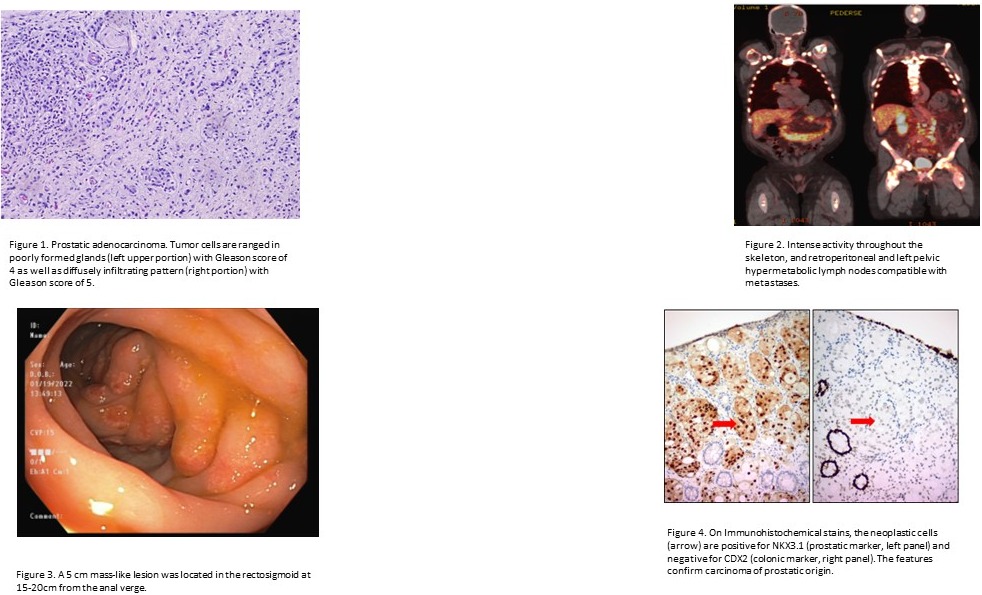Back
Poster Session A - Sunday Afternoon
A0130 - Prostate Cancer With Colonic Metastasis: A Rare Case Report
Sunday, October 23, 2022
5:00 PM – 7:00 PM ET
Location: Crown Ballroom

Ahmad Abulawi, MBBS
Albany Medical College
Albany, NY
Presenting Author(s)
Ahmad Abulawi, MBBS1, Amin Azem, MBBS1, Ibrahim Khatim, MBBS1, Raya Al-Ashram, MBBS2, Wei Wang, MD3, Rebecca O`Malley, MD3, Syed Mehdi, MBBS4
1Albany Medical College, Albany, NY; 2KHCC, Albany, NY; 3Albany Stratton VA Hospital, Albany, NY; 4Albany Stratton VA Medical Center, Albany, NY
Introduction: Prostate cancer poses a high risk of metastasis. The most common metastatic site is the axial skeleton. Rarely this disease metastasizes to the gastrointestinal tract and is unusual in the colon. Here, we are reporting a rare case of prostate cancer with metastasis to the colon.
Case Description/Methods: A-61-year-old male presented with bladder outflow obstruction. Physical exam with digital rectal exam was significant for nodular prostate. Work-up revealed elevated PSA to 1250. Biopsy confirmed the diagnosis of prostate adenocarcinoma and a Gleason score of 4-5 (Figure 1). Staging with positron emission tomography (PET) scan showed retroperitoneal adenopathy and diffuse bone metastasis (Figure 2). Genetic testing showed no actionable alterations. The patient was initially treated with ADT and Taxotere chemotherapy based on high Volume disease (CHAARTED trial). He had a very good clinical and biochemical response (PSA decreased from 1250 to 180). Unfortunately, he progressed after 5 cycles with an increase in his PSA. He was started on second-generation Enzalutamide. He continued to respond for 15 months with his PSA decreasing to 9. He underwent a screening colonoscopy which revealed a 5cm mass in the rectosigmoid (Figure 3). Biopsy and immunohistochemistry surprisingly revealed metastatic adenocarcinoma of prostate origin (Figure 4). The case was discussed in our multidisciplinary tumor board and is currently on Cabazitaxel as per NCCN guidelines. The treatment is currently in process.
Discussion: Only a few cases have been described in the medical literature with colon metastasis from prostate cancer. It is extremely rare as most of the colonic involvement of this disease is driven by local invasion. The metastatic pattern of advanced prostate cancer is well known with bone tissue being the most dominant site for metastasis. Other sites of involvement are lymph nodes, liver, thorax, brain, and kidneys. The literature review has revealed most of the GI tract involvement of this disease is likely to be hormone-refractory and asymptomatic as in our patient. Our patient did not have any GI-related symptoms to the colon mass and was discovered in screening colonoscopy. The patient is currently receiving chemotherapy as per NCCN guidelines and this treatment approach has resulted in a decrease in his PSA level and disease stability. It is imperative for oncologists, gastroenterologists, and urologists to consider the possibility of prostate carcinoma metastasizing to the gastrointestinal tract.

Disclosures:
Ahmad Abulawi, MBBS1, Amin Azem, MBBS1, Ibrahim Khatim, MBBS1, Raya Al-Ashram, MBBS2, Wei Wang, MD3, Rebecca O`Malley, MD3, Syed Mehdi, MBBS4. A0130 - Prostate Cancer With Colonic Metastasis: A Rare Case Report, ACG 2022 Annual Scientific Meeting Abstracts. Charlotte, NC: American College of Gastroenterology.
1Albany Medical College, Albany, NY; 2KHCC, Albany, NY; 3Albany Stratton VA Hospital, Albany, NY; 4Albany Stratton VA Medical Center, Albany, NY
Introduction: Prostate cancer poses a high risk of metastasis. The most common metastatic site is the axial skeleton. Rarely this disease metastasizes to the gastrointestinal tract and is unusual in the colon. Here, we are reporting a rare case of prostate cancer with metastasis to the colon.
Case Description/Methods: A-61-year-old male presented with bladder outflow obstruction. Physical exam with digital rectal exam was significant for nodular prostate. Work-up revealed elevated PSA to 1250. Biopsy confirmed the diagnosis of prostate adenocarcinoma and a Gleason score of 4-5 (Figure 1). Staging with positron emission tomography (PET) scan showed retroperitoneal adenopathy and diffuse bone metastasis (Figure 2). Genetic testing showed no actionable alterations. The patient was initially treated with ADT and Taxotere chemotherapy based on high Volume disease (CHAARTED trial). He had a very good clinical and biochemical response (PSA decreased from 1250 to 180). Unfortunately, he progressed after 5 cycles with an increase in his PSA. He was started on second-generation Enzalutamide. He continued to respond for 15 months with his PSA decreasing to 9. He underwent a screening colonoscopy which revealed a 5cm mass in the rectosigmoid (Figure 3). Biopsy and immunohistochemistry surprisingly revealed metastatic adenocarcinoma of prostate origin (Figure 4). The case was discussed in our multidisciplinary tumor board and is currently on Cabazitaxel as per NCCN guidelines. The treatment is currently in process.
Discussion: Only a few cases have been described in the medical literature with colon metastasis from prostate cancer. It is extremely rare as most of the colonic involvement of this disease is driven by local invasion. The metastatic pattern of advanced prostate cancer is well known with bone tissue being the most dominant site for metastasis. Other sites of involvement are lymph nodes, liver, thorax, brain, and kidneys. The literature review has revealed most of the GI tract involvement of this disease is likely to be hormone-refractory and asymptomatic as in our patient. Our patient did not have any GI-related symptoms to the colon mass and was discovered in screening colonoscopy. The patient is currently receiving chemotherapy as per NCCN guidelines and this treatment approach has resulted in a decrease in his PSA level and disease stability. It is imperative for oncologists, gastroenterologists, and urologists to consider the possibility of prostate carcinoma metastasizing to the gastrointestinal tract.

Figure: Figures 1-4
Disclosures:
Ahmad Abulawi indicated no relevant financial relationships.
Amin Azem indicated no relevant financial relationships.
Ibrahim Khatim indicated no relevant financial relationships.
Raya Al-Ashram indicated no relevant financial relationships.
Wei Wang indicated no relevant financial relationships.
Rebecca O`Malley indicated no relevant financial relationships.
Syed Mehdi indicated no relevant financial relationships.
Ahmad Abulawi, MBBS1, Amin Azem, MBBS1, Ibrahim Khatim, MBBS1, Raya Al-Ashram, MBBS2, Wei Wang, MD3, Rebecca O`Malley, MD3, Syed Mehdi, MBBS4. A0130 - Prostate Cancer With Colonic Metastasis: A Rare Case Report, ACG 2022 Annual Scientific Meeting Abstracts. Charlotte, NC: American College of Gastroenterology.
